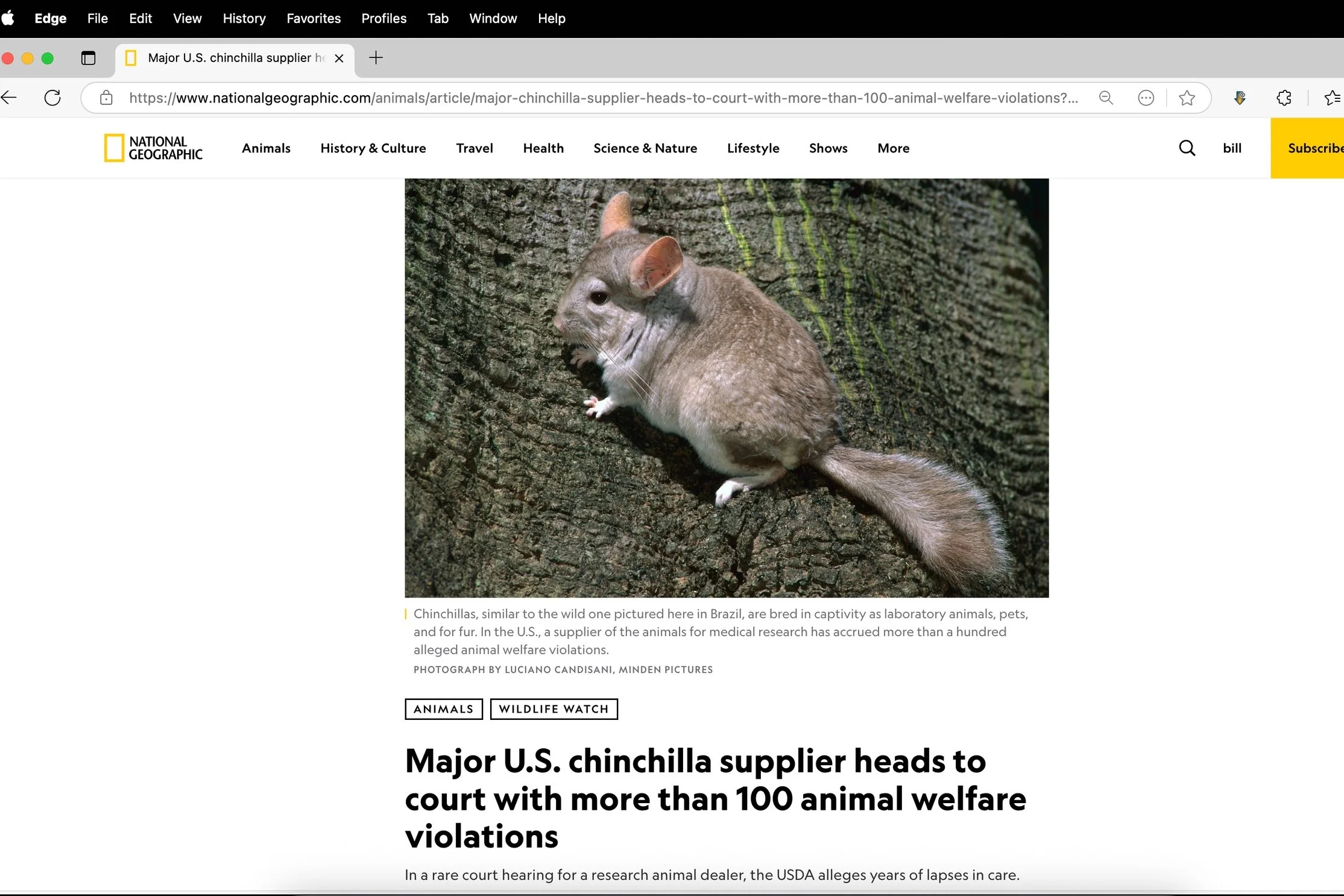In early 2020, Eric wrote the first of five articles in the AWI Quarterly based on his research and analysis of Moulton Chinchilla, which was the longest-tenured supplier of chinchillas for invasive experimentation. He focused on Moulton’s execrable record of animal care, USDA’s appalling failure to act, and the fact that prominent researchers continued to purchase from him despite this egregious record.
Shortly thereafter, in May 2020, as COVID raged, Science magazine published the first of three damning exposés about Moulton, and interviewed researchers who purchased from him. Science also reported on another deficient breeder, Ryerson Chinchilla, for which Eric provided documentation and information.
USDA alleges that Moulton “is filthy and fly-infested, with exposed nails and sharp wire points protruding inside cages, undiscovered dead animals, and scores of sick and unhealthy chinchillas that do not receive adequate veterinary care,” and “noted chinchillas with weeping wounds and sores, untreated abscesses, and crusted, discharging eyes.” -Meredith Wadman
Later that year, after publication of the Science story and two more articles in the AWI Quarterly, Ryerson did not renew her USDA breeder license, and went out of business.
In July 2021, the same month as the start of the USDA hearing on Moulton, Science published another article, further documenting continued animal welfare issues at Moulton. Later that month, National Geographic published the first of its two investigative articles about Moulton. Reporters from both Science and National Geographic attended the USDA hearing virtually, despite Moulton’s objections.
Moulton Chinchilla—a Slow Motion Train Wreck
As Eric wrote in his final AWI Quarterly article about Moulton, the revelations at the USDA hearing were shocking. For the first time, the public discovered that Moulton had literally broken the neck of a suffering chinchilla right in front of “flabbergasted” inspectors, but the USDA took no action, and didn’t even include this shocking act on any inspection reports. A USDA inspector testified that the conditions at Moulton gave him nightmares — in 2014, seven years prior to the hearing.
For over a decade, chinchillas endured what USDA attorneys at the 2021 hearing called “immense, avoidable” suffering without the USDA confiscating a single chinchilla. USDA inspectors continued to document this horrific suffering year after year after year, and researchers continued to purchase from him—but USDA failed to act for almost a decade.
As both Science and National Geographic reported, In October 2021, a USDA administrative law judge finally revoked Moulton’s license. But her decision could not remove the stain of USDA’s appalling failure to act on Moulton, as untold numbers of chinchillas endured this “immense, avoidable suffering” in horrific conditions for almost a decade.
USDA lawyers argued that Moulton willfully violated the AWA for years, leaving sick and injured animals without veterinary care; housing them in decrepit, filthy conditions; and repeatedly failing to make the facility available to inspectors. -Meredith Wadman
As Eric told a University of Oklahoma animal law class in March 2025, Moulton is a damning case study of USDA’s failure to act, and its long history of failing to adequately enforce the Animal Welfare Act. Researchers also continued to purchase chinchillas from him, despite this egregious record.
The Moulton case was a failure at every point of the animal welfare system, and a slow-motion train wreck.


